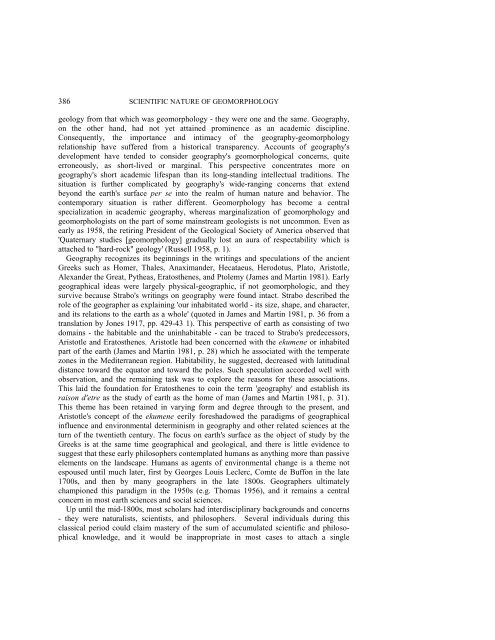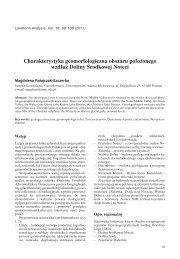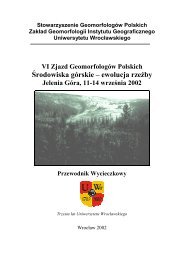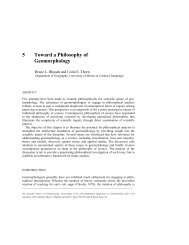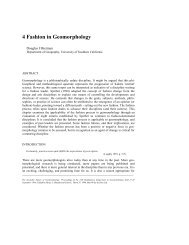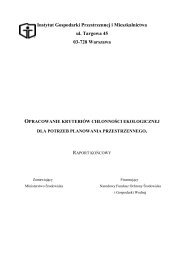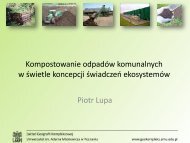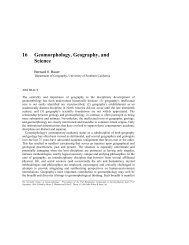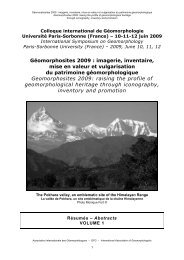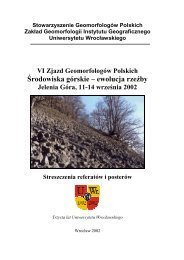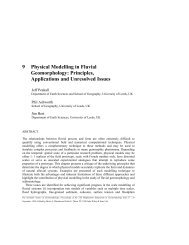Chapter 16 - Geomorphology, Geography, and Science Bernard 0
Chapter 16 - Geomorphology, Geography, and Science Bernard 0
Chapter 16 - Geomorphology, Geography, and Science Bernard 0
You also want an ePaper? Increase the reach of your titles
YUMPU automatically turns print PDFs into web optimized ePapers that Google loves.
386 SCIENTIFIC NATURE OF GEOMORPHOLOGY<br />
geology from that which was geomorphology - they were one <strong>and</strong> the same. <strong>Geography</strong>,<br />
on the other h<strong>and</strong>, had not yet attained prominence as an academic discipline.<br />
Consequently, the importance <strong>and</strong> intimacy of the geography-geomorphology<br />
relationship have suffered from a historical transparency. Accounts of geography's<br />
development have tended to consider geography's geomorphological concerns, quite<br />
erroneously, as short-lived or marginal. This perspective concentrates more on<br />
geography's short academic lifespan than its long-st<strong>and</strong>ing intellectual traditions. The<br />
situation is further complicated by geography's wide-ranging concerns that extend<br />
beyond the earth's surface per se into the realm of human nature <strong>and</strong> behavior. The<br />
contemporary situation is rather different. <strong>Geomorphology</strong> has become a central<br />
specialization in academic geography, whereas marginalization of geomorphology <strong>and</strong><br />
geomorphologists on the part of some mainstream geologists is not uncommon. Even as<br />
early as 1958, the retiring President of the Geological Society of America observed that<br />
'Quaternary studies [geomorphology] gradually lost an aura of respectability which is<br />
attached to "hard-rock" geology' (Russell 1958, p. 1).<br />
<strong>Geography</strong> recognizes its beginnings in the writings <strong>and</strong> speculations of the ancient<br />
Greeks such as Homer, Thales, Anaxim<strong>and</strong>er, Hecataeus, Herodotus, Plato, Aristotle,<br />
Alex<strong>and</strong>er the Great, Pytheas, Eratosthenes, <strong>and</strong> Ptolemy (James <strong>and</strong> Martin 1981). Early<br />
geographical ideas were largely physical-geographic, if not geomorphologic, <strong>and</strong> they<br />
survive because Strabo's writings on geography were found intact. Strabo described the<br />
role of the geographer as explaining 'our inhabitated world - its size, shape, <strong>and</strong> character,<br />
<strong>and</strong> its relations to the earth as a whole' (quoted in James <strong>and</strong> Martin 1981, p. 36 from a<br />
translation by Jones 1917, pp. 429-43 1). This perspective of earth as consisting of two<br />
domains - the habitable <strong>and</strong> the uninhabitable - can be traced to Strabo's predecessors,<br />
Aristotle <strong>and</strong> Eratosthenes. Aristotle had been concerned with the ekumene or inhabited<br />
part of the earth (James <strong>and</strong> Martin 1981, p. 28) which he associated with the temperate<br />
zones in the Mediterranean region. Habitability, he suggested, decreased with latitudinal<br />
distance toward the equator <strong>and</strong> toward the poles. Such speculation accorded well with<br />
observation, <strong>and</strong> the remaining task was to explore the reasons for these associations.<br />
This laid the foundation for Eratosthenes to coin the term 'geography' <strong>and</strong> establish its<br />
raison d'etre as the study of earth as the home of man (James <strong>and</strong> Martin 1981, p. 31).<br />
This theme has been retained in varying form <strong>and</strong> degree through to the present, <strong>and</strong><br />
Aristotle's concept of the ekumene eerily foreshadowed the paradigms of geographical<br />
influence <strong>and</strong> environmental determinism in geography <strong>and</strong> other related sciences at the<br />
turn of the twentieth century. The focus on earth's surface as the object of study by the<br />
Greeks is at the same time geographical <strong>and</strong> geological, <strong>and</strong> there is little evidence to<br />
suggest that these early philosophers contemplated humans as anything more than passive<br />
elements on the l<strong>and</strong>scape. Humans as agents of environmental change is a theme not<br />
espoused until much later, first by Georges Louis Leclerc, Comte de Buffon in the late<br />
1700s, <strong>and</strong> then by many geographers in the late 1800s. Geographers ultimately<br />
championed this paradigm in the 1950s (e.g. Thomas 1956), <strong>and</strong> it remains a central<br />
concern in most earth sciences <strong>and</strong> social sciences.<br />
Up until the mid-1800s, most scholars had interdisciplinary backgrounds <strong>and</strong> concerns<br />
- they were naturalists, scientists, <strong>and</strong> philosophers. Several individuals during this<br />
classical period could claim mastery of the sum of accumulated scientific <strong>and</strong> philosophical<br />
knowledge, <strong>and</strong> it would be inappropriate in most cases to attach a single


